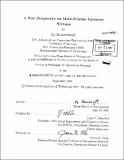| dc.contributor.advisor | John N. Tsitsiklis. | en_US |
| dc.contributor.author | MuharremoglÌ u, Alp, 1975- | en_US |
| dc.contributor.other | Sloan School of Management. | en_US |
| dc.date.accessioned | 2006-03-24T18:03:33Z | |
| dc.date.available | 2006-03-24T18:03:33Z | |
| dc.date.copyright | 2002 | en_US |
| dc.date.issued | 2002 | en_US |
| dc.identifier.uri | http://hdl.handle.net/1721.1/29925 | |
| dc.description | Thesis (Ph. D.)--Massachusetts Institute of Technology, Sloan School of Management, 2002. | en_US |
| dc.description | Includes bibliographical references (p. 123-126). | en_US |
| dc.description.abstract | We present a new methodology for analyzing multi-echelon inventory systems. The methodology relies on decomposing complicated multi-echelon inventory control problems into much smaller and managable subproblems, whose solutions in turn help us either characterize the structure of optimal policies for the corresponding overall problems and/or to compute optimal policies efficiently. We analyze four multi-echelon systems through this perspective. The first system is a serial system with stochastic leadtimes and Markov modulated demand. Here, the methodology amounts to focusing on a single unit as it travels through the supply chain and showing that the original problem is simply a series of single unit problems that are essentially decoupled. We are able to show that state dependent echelon base stock policies are optimal in this setting, both in finite and infinite horizon. A serial system with expediting options is analyzed next. A stage is not restricted to order items from the next upstream stage but can place orders at stages further upstream in the supply chain, by incurring certain extra costs. We show that given a restriction on the expediting cost structure that we call supermodularity, the system decomposes into single unit subproblems. We characterize the structure of optimal policies as extended echelon base stock policies, which is a generalization of echelon base stock policies. Next we study a serial system with batch size constraints. We show that the problem can be decomposed into subproblems, each of which has a single batch. We then show that (R, nQ) policies are optimal for this problem, which can be interpreted as echelon base stock policies that incorporate the batch size restrictions. | en_US |
| dc.description.abstract | (cont.) In addition to providing a simple proof technique, the new approach gives rise to efficient algorithms for the calculation of the policy parameters, for all the systems described above. Finally we analyze an assembly system with stochastic leadtimes. We show that the problem can be decomposed into a series of subproblems, each with a single kit of parts. This enhances our understanding about optimal policies in this setting and we develop a relatively efficient algorithm for the computation of optimal policies. | en_US |
| dc.description.statementofresponsibility | by Alp Muharremogl̆u. | en_US |
| dc.format.extent | 126 p. | en_US |
| dc.format.extent | 4941236 bytes | |
| dc.format.extent | 4941045 bytes | |
| dc.format.mimetype | application/pdf | |
| dc.format.mimetype | application/pdf | |
| dc.language.iso | eng | en_US |
| dc.publisher | Massachusetts Institute of Technology | en_US |
| dc.rights | M.I.T. theses are protected by copyright. They may be viewed from this source for any purpose, but reproduction or distribution in any format is prohibited without written permission. See provided URL for inquiries about permission. | en_US |
| dc.rights.uri | http://dspace.mit.edu/handle/1721.1/7582 | |
| dc.subject | Sloan School of Management. | en_US |
| dc.title | A new perspective on multi-echelon inventory systems | en_US |
| dc.type | Thesis | en_US |
| dc.description.degree | Ph.D. | en_US |
| dc.contributor.department | Sloan School of Management | |
| dc.identifier.oclc | 51897275 | en_US |
